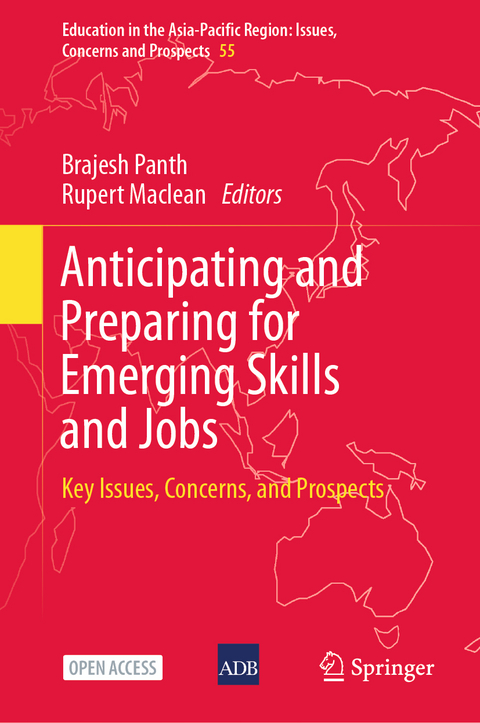
Anticipating and Preparing for Emerging Skills and Jobs
Springer Verlag, Singapore
978-981-15-7017-9 (ISBN)
The book’s 40 articles cover a wide range of topics and reflect the diverse perspectives of the eminent policy makers, practitioners, and researchers who authored them. To maximize its potential impact, this Springer-Asian Development Bank co-publication has been made available as open access.
Brajesh Panth is Chief of Education Sector Group at the Asian Development Bank (ADB). He provides technical leadership to the education sector group (EdSG) in ADB, leads the preparation of the EdSG work plan and facilitates collaboration across sector and technical groups in ADB and with external partners. He has over 25 years of experience in the education sector including sector assessment, project processing, implementation, evaluation, and policy dialogue, covering all levels-primary, secondary, technical and vocational education and training, and higher education. Mr. Panth worked with the World Bank as a senior education specialist in Nepal before joining ADB in 2001. He has also worked in Central Asia, South Asia, China, Ghana, Malawi and the United States. Besides coordinating and contributing to several publications, Mr. Panth has made several presentations in different fora and contributed to policy analysis, policy dialogue and analytical work pertaining to different aspects of education reform. He holds a master’s and a doctorate in education administration, planning and social policy from Harvard University, USA. Professor Rupert Maclean AO located in Melbourne where he is an Adjunct Professor in the School of Education, RMIT University. Immediately prior to returning to Melbourne in February 2019 he was for three years Foundation QAPCO Professional Chair in Vocational Studies, UNESCO Chair on Technical and Vocational Education and Training and Sustainable Development, and Co-ordinator of the UNESCO-UNEVOC Centre for Qatar, at the College of the North Altantic – Qatar. He is concurrently: Honorary Professor, The Education University of Hong Kong; and a Visiting Professor at both East China Normal University, Shanghai, and at the University of Tun Hussein Onn Malaysia. Between 2007 and 2015 he was an Honorary Research Fellow, University of Oxford, Department of Education. In December 2018 he was appointed as a consultant of the Belt and Road Alliance for International Applied Education and Training by the Zhejiang Vocational Education Group, China. In 2011 he was awarded an Order of Australia (AO) in the Queen's Birthday Honours List for distinguished service to improving education and schooling in developing countries, particularly through UNESCO.
1. Introductory Article.- Part 1: Introductory Overview.- 2. Anticipating and Preparing for Emerging Skills and Jobs.- 3. The Future of Work: Is This Time Different?.- 4. Future Implications of the Fourth Industrial Revolution on Education and Training.- 5. Quality Education and Economic Development.- 6. Human Capital Development in South Asia.- 6. Anticipating and Preparing for the Future - One Example from Higher Education: the Singapore Management University (SMU) Experience.- 7. Developing 21st Century Skills for Future Jobs and Societies.- Part 2: Kindergarten to Grade 12 (K to 12) Reforms.- 8. ADB’s Experience in K-12 Reforms and Lessons Learned.- 9. Boosting Student Learning: PISA for Development.- 10. Essentials over Peripherals: The CVIF Dynamic Learning Program.- 11. Pakistan NGO Experience in Providing Quality School Education.- 12. ADB’s Support to K-12 Reforms in Vietnam.- Part 3: Transformational TVET.- 13. Philippine Experience in Dual Training System.- 14. Singapore ITEEducation Services: TVET Excellence Journey.- 15. Industry-Led Training and Apprenticeships: The New Zealand Model.- 16. Gram Tarang: Skills Development for Priority Sectors in India.- 17. Bangladesh Skills for Employmeent Investment Program.- Part 4: Higher Education To Promote Higher Level Skills.- 18. New Trends in Higher Education and How ADB Is Responding.- 19. Education Innovations: South Korea, Hong Kong, and Indonesia.- 20. Collaborative Innovation between Shenzhen Municipal Government and Tsinghua University.- 21. University of South Pacific: Promoting Regional Cooperation.- Part 5: Transformational Educational Technology.- 21. An Overview of Innovations in Online Learning.- 22. Coding as Essential Skills in the 21s Century.- 23. Bringing TVET Up to Speed: Regional Overview of ICT-Enhanced Practices in TVET.- 24. Udemy: Blended and eLearning for Transforming Teaching and Learning.- 25. Mindtree’s Experience in Global Learning Center.- Part 6: Technology Platforms for Bridging the Skills Gap and for Career Counselling and Guidance.- 26. Empowering Filipino Youth Through Technology and Community.- 27. Singapore’s Experience in Analyzing Labor Market Using Artificial Intelligence (AI) and Big Data Analytics.- 28. Funzi Uses the Power of Mobile to Give Everyone Cost-Effective Access to Quality Learning.- 29. How Technology Affect Jobs: A Smarter Future for Skills, Jobs, and Growth in Asia.- Part 7: Cross Sectoral Collaboration For Skills Development.- 30. Build4Skills, TVET and Infrastructure – An Innovative Initiative.- 31. Skills Development for Elderly Care.- 32. Skills Development for Agriculture: Example from Thailand.- 33. Skills Development in People’s Republic of China.- 34. European Training Foundation (ETF): Sector and Cross Sector Cooperation.- Part 8: Moving Forward: Conclusion And Recommendations.
| Erscheinungsdatum | 09.11.2020 |
|---|---|
| Reihe/Serie | Education in the Asia-Pacific Region: Issues, Concerns and Prospects ; 55 |
| Zusatzinfo | 21 Illustrations, color; 2 Illustrations, black and white; XXVI, 351 p. 23 illus., 21 illus. in color. |
| Verlagsort | Singapore |
| Sprache | englisch |
| Maße | 155 x 235 mm |
| Themenwelt | Sozialwissenschaften ► Pädagogik ► Berufspädagogik |
| Sozialwissenschaften ► Pädagogik ► Erwachsenenbildung | |
| Wirtschaft ► Betriebswirtschaft / Management ► Personalwesen | |
| Wirtschaft ► Betriebswirtschaft / Management ► Unternehmensführung / Management | |
| ISBN-10 | 981-15-7017-5 / 9811570175 |
| ISBN-13 | 978-981-15-7017-9 / 9789811570179 |
| Zustand | Neuware |
| Informationen gemäß Produktsicherheitsverordnung (GPSR) | |
| Haben Sie eine Frage zum Produkt? |
aus dem Bereich


